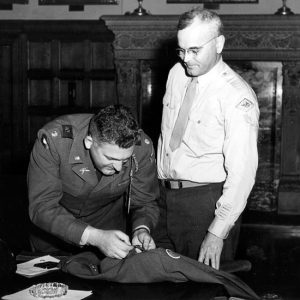calsfoundation@cals.org
Arkansas National Guard Adjutants General
The adjutant general is appointed by the governor of Arkansas to a state cabinet-level position as the director of the Arkansas Military Department. As the executive head of the Arkansas Military Department, the adjutant general is responsible for the command, control, and supervision of more than 10,000 soldiers and airmen assigned to the Arkansas Air and Army National Guard. The adjutant general is responsible for all military administration transactions between the United States and the State of Arkansas, including personnel, finance, logistics, and unit readiness. The adjutant general is responsible for training personnel and units to accomplish both the state and federal missions of the National Guard and performs all other duties pertaining to the office as prescribed by law.
An adjutant general has been in charge of Arkansas’s militia or National Guard (with one interruption) since at least 1806. The laws governing what is now Arkansas, passed by the governor and judges of the Indiana Territory on October 5, 1804, stipulated: “And be it further enacted that there shall be an adjutant general appointed in the district….” Subsequent territorial and early statehood governing documents and legislation kept the requirement for an adjutant general and defined the scope of the duties of the office, but a scattered population and sparse roads made it difficult for the militia to train and for the adjutant general to perform the duties of the office.
After the Civil War, as Arkansas struggled to reestablish local governments in the post-Reconstruction era, civil unrest was common. Governor William Miller was forced to call for support from the militia to keep the peace. Legislators saw this as interference in local politics, and, in 1879, the Arkansas General Assembly, over the governor’s veto, passed Act 44, which abolished the office of the adjutant general. Arkansas was without an adjutant general until the 1909 Arkansas General Assembly passed Act 337, reviving the office.
Act 337 was likely a result of the passage of the Militia Act of 1903 by the Fifty-seventh U.S. Congress. Commonly referred to as the Dick Act after its sponsor, Charles Dick (R-OH), the act gave federal status to state militias and required that they conform to standard army organizations, attend a minimum of training, and be inspected by a representative of the U.S. Army annually. In return, state militias were provided with federal equipment and were paid, with federal funds, for some of their training.
As the involvement of the National Guard in the nation’s defense has increased, the role of the adjutant general has taken on a greater importance, and the Arkansas legislature has recognized that change. The legislature has increased the responsibilities of the office and has placed a requirement that the Arkansas adjutant general be federally recognized or eligible for federal recognition. This means the Arkansas adjutant general must have completed the same educational requirements of an active-duty officer with the rank of major general.
For additional information:
Castle, John T. Supplement to Kirby’s Digest of the Statutes of Arkansas. Vol. 1. Indianapolis: The Bobbs-Merrill Company, 1911.
Dillard, Tom. “‘An Arduous Task to Perform’: Organizing the Territorial Arkansas Militia.” Arkansas Historical Quarterly 41 (Summer 1982): 174–190.
Steve Rucker
Little Rock, Arkansas









Comments
No comments on this entry yet.